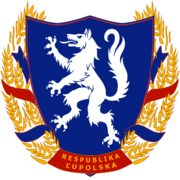Stanislav Kolar
This article is incomplete because it is pending further input from participants, or it is a work-in-progress by one author. Please comment on this article's talk page to share your input, comments and questions. Note: To contribute to this article, you may need to seek help from the author(s) of this page. |
Stanislav Kolar | |
|---|---|
 Kolar in 1928 | |
| Chairman of the Communist Party of Luepola | |
| In office 21 February 1916 – 10 August 1936 | |
| Premier | Valent Jugovać Filip Takovski Martin Zauhar |
| Preceded by | Lev Gincburg |
| Succeeded by | Anton Marusić |
| Chairman of the Socialist Internationale | |
| In office 11 December 1919 – 11 December 1923 | |
| Preceded by | Position Established |
| Succeeded by | Kaarlo Siitonen |
| In office 20 February 1931 – 20 February 1935 | |
| Preceded by | Lázár Molnár |
| Succeeded by | Eero Ryti |
| Personal details | |
| Born | Stanislav Luka Kolar 13 July 1863 Krajuna, Cărnipoře, Luepola |
| Died | 10 August 1936 (aged 73) Prishek, People's Republic of Luepola |
| Political party | Communist Party of Luepola |
| Alma mater | University of Obránse |
Stanislav Kolar (Luepolan: [ˌstaniˈslav ˈkɔlar]; 13 June 1863 – 10 August 1936) was a Luepolan politician who served as the leader of the People's Republic of Luepola from 1916 until his death in 1936. Spending much of his life as a loyal follower of Flecquist thought and as a student of Lev Gincburg, he succeeded Gincburg as the Chairman of the Communist Party of Luepola, by then coterminous with the position of the President of Luepola. Kolar departed from Gincburg's domestic-oriented form of Flecquism and implemented a radical, internationally-oriented form, sponsoring and assisting foreign Communist movements. His assistance of foreign Communist movements led to Communist politicians and parties taking power in Poicary, Granzery, and Apelia during his rule. Kolar is also responsible for the Luepolan Liquidation, in which hundreds of party officials and military officers were arrested and killed on dubious charges.
Kolar's efforts to advance Communism on the international stage were highly influential in establishing the geopolitical situation that would facilitate the Great War six years after his death.
